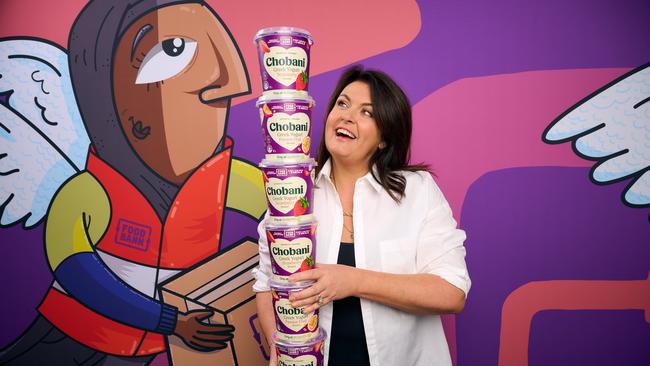Chobani donates profits in social impact drive to prove profits and purpose can coexist
Can a brand grow while giving its profits to charity? Market leading yoghurt brand Chobani believes it can and through its long term partnership with Foodbank wants to demonstrate how social impact can benefit businesses.

Chobani has launched a social impact campaign which sees the brand donate all profits from sales of a limited edition yoghurt tub to charity Foodbank as it seeks to showcase how doing good can help drive profits.
The campaign, which is running in partnership with Woolworths, means Foodbank receives the equivalent of six meals for every 907g tub of Passion Fruit and Strawberry yoghurt, which retails for $7.90.
Chobani’s general manager ESG and general counsel Tim Browne told The Growth Agenda the campaign was an example of the brand’s purpose which places social impact “front and centre” as a core strategic pillar for the business.
“Chobani has always been a business founded on more than simply producing product for the purposes of profit, it’s always been about doing good and delivering impact in and around the communities in which we operate. We have a strategic objective, to deliver on that purpose and make a difference using food as a force for good.”
Chobani is a relatively young FMCG player, having launched in Victoria in 2011 after buying Bead Foods, the producers of Gippsland Dairy. Driven by its focus on natural ingredients and wellness alongside a savvy retail media strategy, Chobani has experienced meteoric growth to become Australia’s number one yoghurt brand in both size and value. Roy Morgan figures from 2021 reveal the brand seized a 20 per cent market share, while Circana figures from April report Chobani has 12.5 per cent dollar share of the yoghurt category.
Following a strategic restructure two years ago, Chobani elevated its ESG strategy, among a host of initiatives was a similar Foodbank campaign which resulted in the donation of half a million meals. The current campaign has already outdone that effort, donating more than 600,000 meals with another three months left to run.
The latest campaign included an opportunity to experience a three-course meal at chef Karen Martini’s Saint George restaurant for just $7.90 with all profits going to Foodbank.
The strategy is tapping into an overall increase in consumer preference for brands that are perceived to be giving back to people.
“We know that consumers certainly have a strong expectation that brands and companies these days will play a role in important social and sustainability issues,” Mr Browne said.
“Every month we conduct research with consumers around yoghurt consumption patterns and their awareness of and attitudes towards brands within the category. The data suggests that there is a strong correlation between top selling brands and consumers’ association with those brands’ support of social and charitable causes.
“We have seen an increase in this metric for Chobani since the launch of the Foodbank (partnership) compared with the same time last year which also aligns with the growth in sales and market share we have experienced.
“Does it provide a halo effect? We certainly think so. But that’s almost a by-product. That’s not actually the reason we’re necessarily doing that; we’re entering into these programs because there’s a genuine need.”
Mr Browne said Chobani maintained a long-term partnership with Foodbank, which began in 2012, and continued to donate fresh stock weekly because the price point and refrigeration requirements of yoghurt made it “a bit of a luxury product”. “Unfortunately when people are in need, it’s one of the products that falls off the shopping list.”
The US-based yoghurt brand, which launched in 2005, is run by founder and global chief executive Hamdi Ulukaya, who remains the majority owner.
It is Mr Ulukaya’s philosophy that business can be a force for good and he has embedded this ethos throughout the company.






